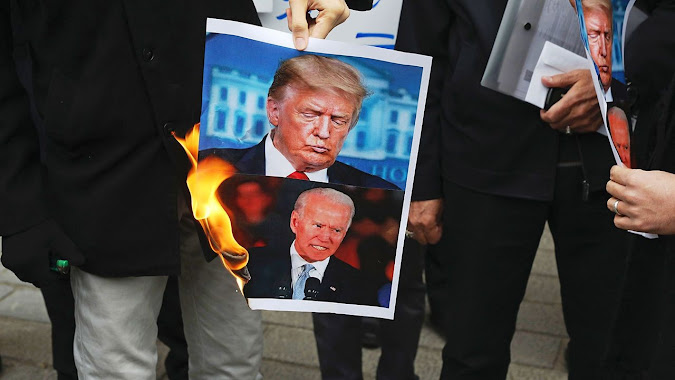Danger and deals in the Middle East
From Nixon to China, to Trump to Tehran
Iran is weak. For America’s next president that creates an opportunity
IN washington the “Nixon to China” tagline has lost its attraction.
Both parties are too hostile towards the People’s Republic for a miraculous reconciliation to be possible.
Perhaps, though, Donald Trump can find a replacement—with Iran.
In his first term he ditched the Joint Comprehensive Plan of Action (JCPOA), a nuclear deal signed in 2015, and promised to negotiate a better one by applying “maximum pressure”.
That didn’t work.
Joe Biden sought to reduce tensions with Iran but is leaving office with the Middle East on fire.
In January the president-elect will have a second chance.
He should use it to rescue a relationship that has poisoned America’s presence in the Middle East for almost five decades.
Mr Trump’s failing the first time round was that no one knew what he wanted.
Was maximum pressure supposed to produce a stronger nuclear pact?
Or was it to force Iran into changing its foreign policy?
Or to remove the regime altogether?
Mr Biden made the opposite mistake.
His aides fiddled with the JCPOA and got too soft.
Lax enforcement of sanctions meant that Iran’s oil exports more than tripled after 2020, helping keep the regime afloat.
A new Iran policy needs to combine stronger pressure with a negotiating path and more ambitious goals.
The pressure is justified.
Iran’s behaviour has been worse than ever.
It has produced four bombs’-worth of highly enriched uranium.
Its proxies wage war with Israel and menace trade in the Red Sea, and its arms-makers churn out missiles and drones for Russia.
People close to Mr Trump say he will move quickly to choke off Iran’s oil sales.
Better enforcement of sanctions would deprive Iran of billions of dollars in revenue.
European signatories to the JCPOA should trigger “snapback” provisions to restore multilateral sanctions, and America should put pressure on key trading hubs, including Dubai.
America should also make clear that it holds open the option of a sustained campaign of bombing to destroy Iran’s nuclear programme.
Pressure is only half the equation.
Less obviously, America should match harsh actions with the promise of something better.
Even Gulf states that once urged maximum pressure now welcome detente.
For one thing, pressure alone may bring about a repeat of Mr Trump’s first term.
Tensions will spiral, and Iran may lash out at Gulf states and American interests.
Another snag is that reviving the JCPOA would not be enough.
Stricter limits on Iran’s nuclear work and intrusive monitoring are needed.
A deal must also include a pledge from Iran that it will limit its missile-development programme and stop backing regional militias.
Iran has rejected such demands before.
Why would it agree now?
The Islamic Republic is at its weakest since the war with Iraq in the 1980s.
Its strategy of deterrence is in tatters.
Hizbullah, its strongest proxy, has been battered by Israel, which has also destroyed much of its air defences, making bombing nuclear sites easier.
Inflation is high and young Iranians are angry.
Ali Khamenei, the supreme leader, 85, lacks a successor.
Mr Trump should make clear that regime change is not his goal and avoid surprises by ensuring that Israel co-ordinates any military action with America.
If Iran meets his demands he could offer a big reward: the prospect of normal ties.
America’s prize would be the prospect of security in the Middle East, freeing it to focus on Asia.
Countless obstacles oppose such a grand bargain.
But Mr Trump loves photo ops.
It would be hard to top the first ever meeting between an American and an Iranian president.
Just imagine: Trump to Tehran.

0 comments:
Publicar un comentario